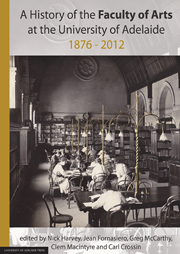Book contents
- Frontmatter
- Contents
- List of Contributors
- 1 The Faculty of Humanities and Social Sciences and the BA Degree at the University of Adelaide since 1876
- 2 Webs of Significance: an Ethnographer's Account of Anthropology at the University of Adelaide from 1973 to 2011
- 3 The History of the Centre for Asian Studies at the University of Adelaide
- 4 Classics at the University of Adelaide (1874–2012)
- 5 English and Creative Writing: ‘the abode of … literature; the home of poetry and fiction’
- 6 A Tale of Resilience: the History of Modern European Languages at the University of Adelaide
- 7 Geography, Environment and Population at the University of Adelaide, 1904–2012
- 8 Gender Studies and Social Analysis
- 9 History
- 10 The History of Aboriginal Languages and Linguistics at the University of Adelaide
- 11 The Digital, Participatory and International Turn: Media at the University of Adelaide
- 12 Musical fusions
- 13 Philosophy at the University of Adelaide
- 14 Politics at the University of Adelaide
- Appendices
5 - English and Creative Writing: ‘the abode of … literature; the home of poetry and fiction’
Published online by Cambridge University Press: 05 June 2013
- Frontmatter
- Contents
- List of Contributors
- 1 The Faculty of Humanities and Social Sciences and the BA Degree at the University of Adelaide since 1876
- 2 Webs of Significance: an Ethnographer's Account of Anthropology at the University of Adelaide from 1973 to 2011
- 3 The History of the Centre for Asian Studies at the University of Adelaide
- 4 Classics at the University of Adelaide (1874–2012)
- 5 English and Creative Writing: ‘the abode of … literature; the home of poetry and fiction’
- 6 A Tale of Resilience: the History of Modern European Languages at the University of Adelaide
- 7 Geography, Environment and Population at the University of Adelaide, 1904–2012
- 8 Gender Studies and Social Analysis
- 9 History
- 10 The History of Aboriginal Languages and Linguistics at the University of Adelaide
- 11 The Digital, Participatory and International Turn: Media at the University of Adelaide
- 12 Musical fusions
- 13 Philosophy at the University of Adelaide
- 14 Politics at the University of Adelaide
- Appendices
Summary
At the University's formal opening ceremony on 25 April 1876, the Adelaide Town Hall reverberated with the words of Shakespeare, Milton, Coleridge, and Wordsworth, as dignitaries set forth their visions for the institution's future. English literature was an important symbol of the British civilisation they wished to implant in a dry and dusty city in the antipodes and, as well as quoting from revered authors, the speeches stressed the value of a literary education. Walter Watson Hughes was not present, but for him, too, the discipline of English represented the best and most respectable traditions of culture and learning, and he had specified that one of the two chairs to be founded with his gift of £20,000 should be in ‘English Language and Literature and Mental and Moral Philosophy’. Hughes had first established himself in the rough and tumble world of whaling and opium trading but, in South Australia, had been able to take up more reputable pursuits; the chair's lofty title in part signified how far he had come.
For the University of Adelaide's first decades, professors of English were from Scotland and Ireland, reflecting the fact that, internationally, the discipline was strong in the Universities of Edinburgh, Glasgow, and Dublin; there was no chair of English at Oxford until 1904 or Cambridge until 1911. Hughes stipulated that the English and Philosophy chair should be filled by the Reverend John Davidson, a Scottish Presbyterian minister who was lecturing on these topics at Union College, a multi-denominational theological institution founded in Adelaide in 1872.
- Type
- Chapter
- Information
- A History of the Faculty of Arts at the University of Adelaide1876-2012, pp. 109 - 132Publisher: The University of Adelaide PressPrint publication year: 2012

